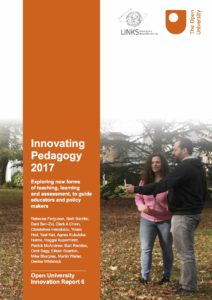AACE News Roundup Fall 2017

The AACE Review News Roundup is a periodical summary of educational technology themes and debates in the blogosphere. For the review, we scan the latest posts of over 20 blogs, and we constantly add new voices to the mix. Also see our 2015 list of who to follow in EdTech.
This news roundup was put together in collaboration with our social media intern Cynthia Prather.
Human vs. Technology: Teachers or Robots?
The role of artificial intelligence was a hot topic during the recent E-Learn 2017 conference in Vancouver. During a panel discussion, Tom Reeves asked a provocative question: “Do you think you’re smarter than a robot? There’s a race going on between human learning and machine learning. And, if you think you’re an instructional designer and you’re going to win that race, you may be sadly mistaken” (Access the E-Learn Panel online).
In the blogosphere, Steve Wheeler takes an opposing position to the human versus technology debate, positing that any computer that can be replaced by a teacher, should be. Wheeler states that despite the technological advances, humans have many characteristics that are impossible to mimic. His closing is definitive: “Teachers won’t be replaced by computers because it is nigh on impossible to describe accurately what teachers do. Much is intuitive, creative or unpredictable and cannot be made into neat algorithms. […] Technology was created to serve our needs as humans, not to replace us”.
Tim Holt offers a critical response, arguing that “all of the roles and attributes of teachers can be replicated by machine intelligence” and Stephen Downes disagrees with the representation of AI as rule-following devices – read Wheeler’s rebuttal.
Open Educational Resources (OER): The Value of Open
David Wiley is committed to do more writing and thinking about openness as a value over the coming year. He offered a few questions to consider: What are the values that animate your work in open education? What are the values that you associate most closely with “open” in the educational context? In a follow-up post, he argues that cost-savings should not be the only argument for OER – which turned into an interesting debate with Stephen Downes and Jim Groom. What do you think – is it about the money or about the possibilities, or both?
If you are interested in OER, don’t miss the excellent E-Learn 2017 keynote by Rajiv Jhangiani, from Kwantlen Polytechnic University, Canada. While openness creates access, it is equally about promoting agency.
In the News: GOP Tax Plan: How Will It Affect Higher Education?
On the congressional front, the new tax plan being proposed by the GOP has some potential implications for higher education. The House version of the plan would end the tax break graduate students get on the value of their tuition waivers — the free tuition and stipend that grad students get in exchange for helping professors with teaching and research. The Senate plan does not include many provisions of the House plan directly affecting student benefits but does include a proposal that would create new costs for nonprofit entities like universities with business income unrelated to their core education mission. In addition, a proposed provision to eliminate the ability to deduct any state and local taxes from a taxpayer’s federal liability could have a broader impact on public higher education by reducing the amount of money that states have available to allocate to higher education institutions.
Quick Notes
- Grainne Conole reports two interesting topics from her recent conference travels ‘Pedagogical Patterns’ and the ICAP framework.
- The eLearning Industry blog has a great post on Bitcoin Blockchain.
- Thomas Vanderwal reviews the app Omni Outliner for personal knowledge management.
- John Spencer offers 10 creative ideas to replace ‘showing movies before break’.
- Stephanie Evergreen released a new version of the qualitative chart chooser – a tool for everyone who prepares a conference presentation.
New Publications
 If you are looking for a great edutech read during a dark winter night, don’t miss the 2017 Innovating Pedagogy Report. This series of reports explores new forms of teaching, learning, and assessment for an interactive world, to guide teachers and policy makers in productive innovation. This sixth report, produced in collaboration with the Learning In a NetworKed Society (LINKS) Israeli Center of Research Excellence (I-CORE), proposes ten innovations that are already in currency but have not yet had a profound influence on education.
If you are looking for a great edutech read during a dark winter night, don’t miss the 2017 Innovating Pedagogy Report. This series of reports explores new forms of teaching, learning, and assessment for an interactive world, to guide teachers and policy makers in productive innovation. This sixth report, produced in collaboration with the Learning In a NetworKed Society (LINKS) Israeli Center of Research Excellence (I-CORE), proposes ten innovations that are already in currency but have not yet had a profound influence on education.
About Cnythia Prather
A trained educator who loves to write, Cynthia Prather brings over 30 years of experience in planning, researching, implementing, and documenting education programs in the United States and the developing world. She has produced a variety of informational documents, including teaching/learning materials, project profiles and summaries, final reports, community newsletters, and marketing pieces. She also has been a tutor and classroom teacher and currently is tutoring high school and community college students in reading and writing. Ms. Prather has an undergraduate degree in education from Bucknell University and a masters in curriculum and teaching from Howard University.
